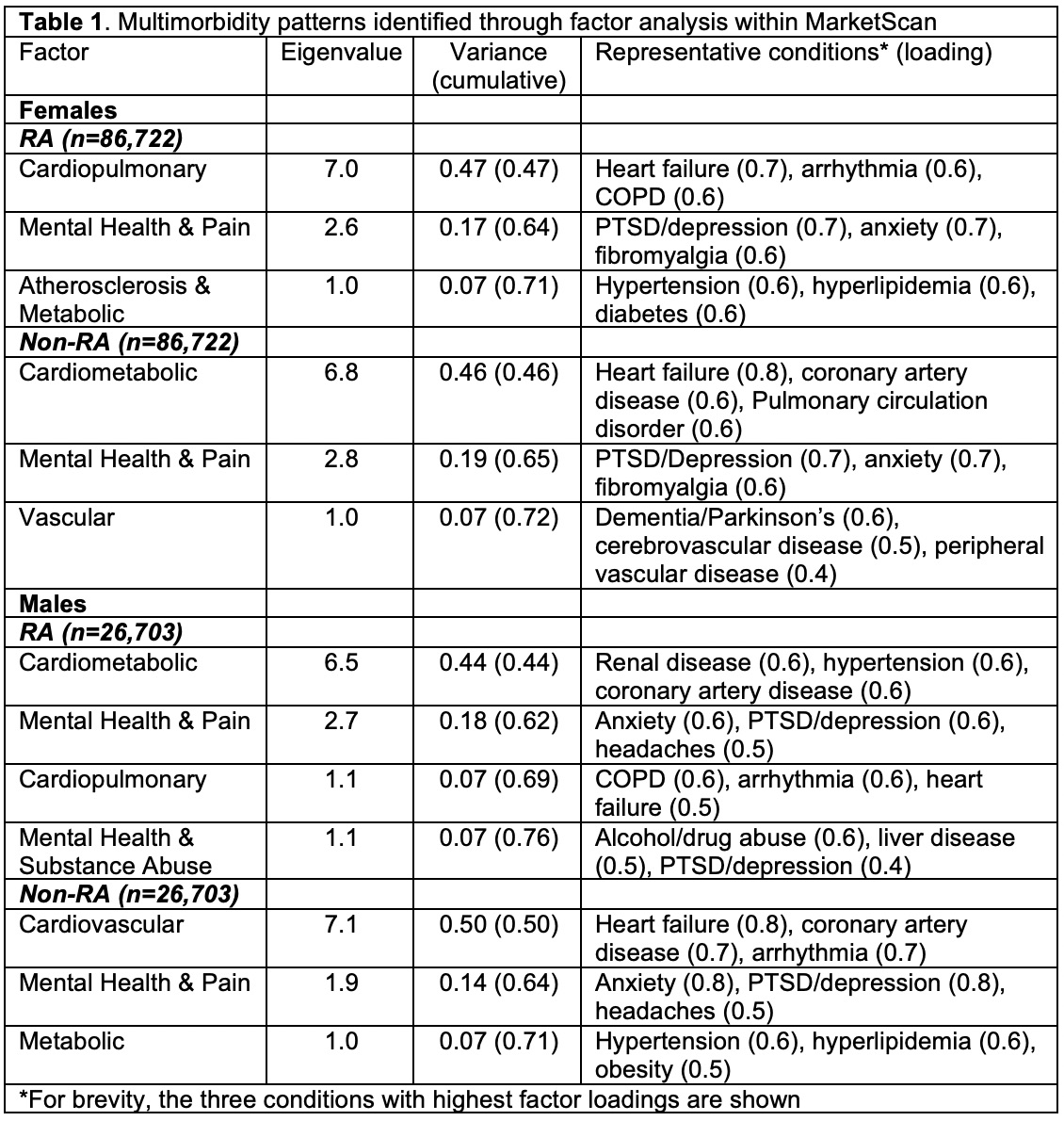Session Information
Date: Friday, November 6, 2020
Title: RA – Diagnosis, Manifestations, & Outcomes Poster I: Multimorbidity
Session Type: Poster Session A
Session Time: 9:00AM-11:00AM
Background/Purpose: Chronic conditions often complicate the disease course of rheumatoid arthritis (RA) and predispose to poor long-term outcomes. The interrelationship of individual chronic conditions and their contribution to the overall burden of multimorbidity afflicting patients with RA is not well understood. We aimed to identify patterns of multimorbidity in RA using unsupervised machine learning.
Methods: We constructed RA and age-, sex-, and year-matched (1:1) non-RA cohorts within a large commercial insurance database (MarketScan, 2006-2015) and the Veterans Health Administration (VHA, 2001-2015) using validated administrative algorithms for RA. Chronic conditions (n=44, selected based on relevance to multimorbidity in the general population and RA) were identified using diagnosis codes from outpatient and inpatient encounters. Unsupervised machine learning was conducted separately in both databases and stratified by RA status and sex, to identify patterns of multimorbidity. Tetrachoric correlation coefficients were calculated between pairs of chronic conditions. Factor analysis was performed on this correlation matrix using the principal factor method. Factors with Eigenvalues ³1 were retained and an orthogonal rotation was executed on the extracted factors. Conditions with a factor loading >0.3 were considered relevant to the extracted factor, and patients were considered to have the multimorbidity pattern specified by that factor if they had at least 2 conditions with factor loadings >0.3 for that factor. The prevalence of the derived multimorbidity patterns was compared between RA and non-RA patients using conditional logistic regression.
Results: We studied 226,850 patients in MarketScan (76% female, mean age 53 [female] and 58 [male] years) and 120,780 patients in the VHA (89% male, mean age 53 [female] and 64 [male] years). In both MarketScan (Table 1) and the VHA (Table 2), cardiovascular, metabolic, cardiopulmonary, mental health, and pain disorders were the primary patterns of multimorbidity identified in RA and non-RA populations. Similar multimorbidity patterns were also derived separately in men and women. The frequency of each multimorbidity pattern was significantly higher in RA (odds ratios ranging from 1.17 to 2.96), with cardiopulmonary, mental health, and pain disorder related multimorbidity patterns most closely associated with RA (Table 3).
Conclusion: Using two independent, large, real-world datasets and unsupervised machine learning, we identified cardiometabolic, cardiopulmonary, and mental health/pain disorders as the predominant patterns of multimorbidity in RA. Patterns of multimorbidity are similar between RA and non-RA populations, suggesting the interrelationships of chronic conditions is similar in RA as in the general population. However, because the prevalence of these overlapping disease processes is significantly higher in RA, it is imperative for clinicians to recognize and address these patterns of multimorbidity to achieve optimal long-term outcomes for patients with RA.
 Table 1. Multimorbidity patterns identified through factor analysis within MarketScan
Table 1. Multimorbidity patterns identified through factor analysis within MarketScan
 Table 2. Multimorbidity patterns identified through factor analysis within the Veterans Health Administration
Table 2. Multimorbidity patterns identified through factor analysis within the Veterans Health Administration
 Table 3. Prevalence of multimorbidity patterns in RA and non-RA patients
Table 3. Prevalence of multimorbidity patterns in RA and non-RA patients
To cite this abstract in AMA style:
England B, Yang Y, Roul P, Haas C, Najjar L, Sayles H, Yu F, Sauer B, Baker J, Michaud K, Xie F, Curtis J, Mikuls T. Identification of Multimorbidity Patterns in Rheumatoid Arthritis Through Machine Learning [abstract]. Arthritis Rheumatol. 2020; 72 (suppl 10). https://acrabstracts.org/abstract/identification-of-multimorbidity-patterns-in-rheumatoid-arthritis-through-machine-learning/. Accessed .« Back to ACR Convergence 2020
ACR Meeting Abstracts - https://acrabstracts.org/abstract/identification-of-multimorbidity-patterns-in-rheumatoid-arthritis-through-machine-learning/
